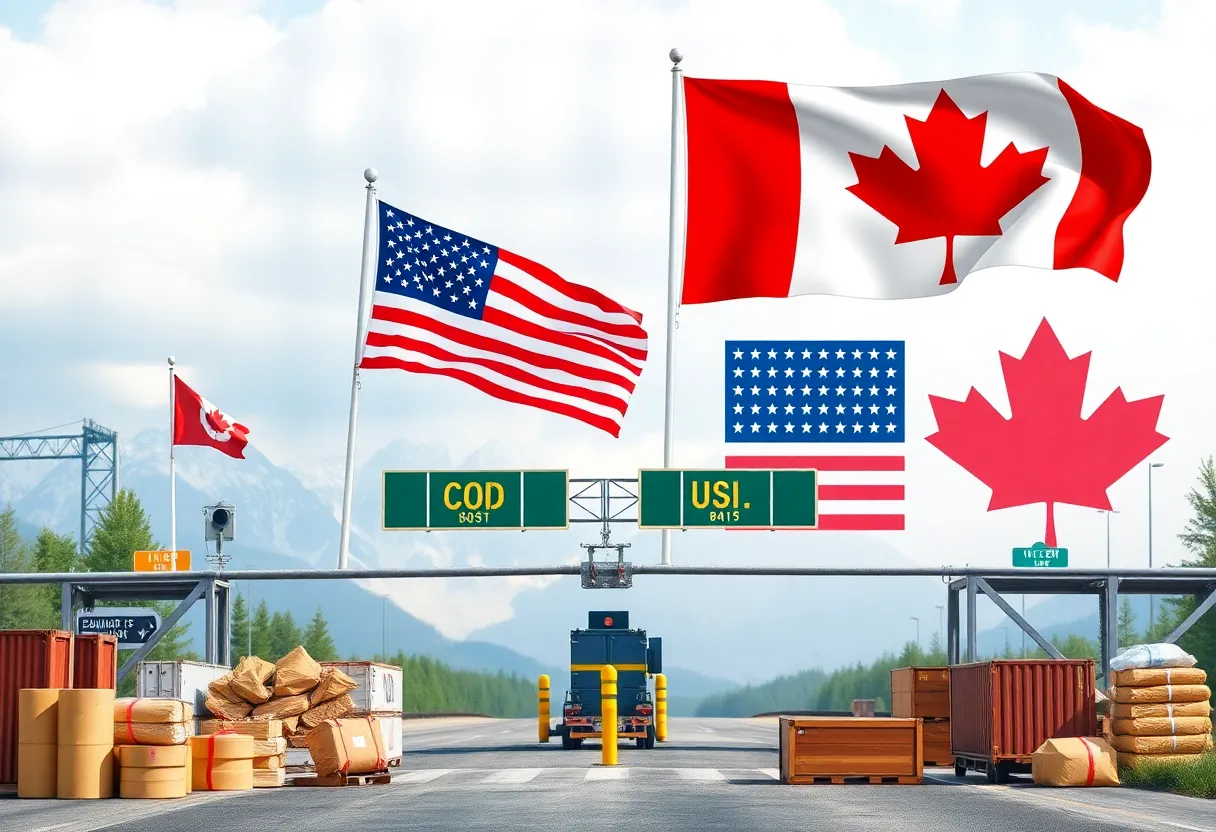

Conceptual image representing the rising trade tensions between Canada and the United States over tariffs.
In light of proposed U.S. tariffs that may impose a 25% levy on Canadian imports, Canadian officials are developing a three-stage retaliatory strategy to mitigate economic impacts. This move could significantly affect the Canadian economy, jeopardizing hundreds of thousands of jobs. As Canada engages with U.S. lawmakers to advocate against these tariffs, the situation remains tense amidst ongoing leadership changes in Canada.
Canadian officials are gearing up for a potential trade standoff with the United States, as fears emerge that President-elect Donald Trump will impose a hefty 25% tariff on Canadian imports once he takes office. This move would not only affect businesses but could also have a serious impact on consumer products worth an estimated 37 billion Canadian dollars (approximately $25.6 billion).
If implemented, these tariffs would cover a wide range of Canadian goods, leading to significant economic repercussions in Canada. Experts suggest that the tariffs could reduce Canada’s GDP by anywhere between 1.8% and 3.38%, while also having a negative effect on the U.S. economy, with potential GDP declines of 0.9% to 1.6%.
In response, officials in Canada are considering a strategic three-stage plan of retaliatory tariffs and trade restrictions. This approach aims to specifically target goods produced in Republican or swing states, likely intending to apply pressure on Trump’s allies and make the political stakes clear.
The urgency of the situation has led Canada’s foreign minister, Mélanie Joly, to engage directly with Republican lawmakers in Washington, advocating against the proposed tariffs. Meanwhile, Canadian Trade Minister Mary Ng has mentioned that everything is on the table when it comes to possible countermeasures, which could even include a dollar-for-dollar retaliation.
Stepping further into economic tactics, there’s even chatter about possibly imposing export taxes on the essential Canadian oil and gas shipments to the U.S., should the tariffs become a reality. This measure could have major implications since around 40% of the crude oil running through U.S. refineries originates from Canada, underscoring the deep interdependence between the two nations’ economies.
The potential fallout from these tariffs is significant, with analysts estimating that a sharp increase in tariffs could jeopardize up to 500,000 jobs in Ontario and around 50,000 in Alberta. As the nation braces itself for these potential disruptions, Prime Minister Justin Trudeau has stressed the importance of a coordinated national response to the challenge.
Interestingly, divisions are appearing within Canadian leadership. Alberta’s Premier Danielle Smith has expressed her strong opposition to leveraging energy exports as a bargaining chip in this tariff turmoil. Smith also did not support joint statements made during meetings with Trudeau, reflecting a need for consensus among Canadian leaders as they face off against potential U.S. tariffs.
Canadian officials are not sitting idle; they have been actively reaching out to their U.S. counterparts to discourage the tariff imposition. Efforts have even extended to venues like Trump’s Mar-a-Lago resort, aiming for a dialogue that emphasizes the importance of their trade relationship.
As a sign of goodwill and willingness to address concerns raised by Trump, Canada’s government is working to reinforce border security. This is crucial, especially as both countries navigate through an evolving political landscape and trade relationship.
Adding another layer of complexity is the ongoing leadership transition in Canada, with Prime Minister Trudeau announcing plans to step down amidst various political challenges. These shifting sands could make the negotiation landscape murkier, bringing uncertainty to how these trade tensions will play out in the months ahead.
As this trade predicament unfolds, Canadians will be watching closely. With the U.S. imposing potential tariffs that could shake up the very fabric of trade between the two countries, the ripple effects could change how both sides approach their economic partnerships. Fingers crossed that a resolution can be reached before the situation escalates!
News Summary Detroit has achieved a major milestone in its Blight-Busting Initiative, demolishing its 8,000th…
News Summary General Motors (G.M.) has announced a profit of $1.9 billion for the second…
News Summary In Farmington Hills, MI, insurance agents Rand Sre and Tobby Rae Jablonski have…
News Summary South Haven, Michigan, is facing a serious drowning crisis, with alarming statistics showing…
News Summary Starting Monday night, traffic disruptions are anticipated in Michigan's Upper Peninsula due to…
News Summary CAVA has opened its first location in Michigan, located in Canton at 43450…